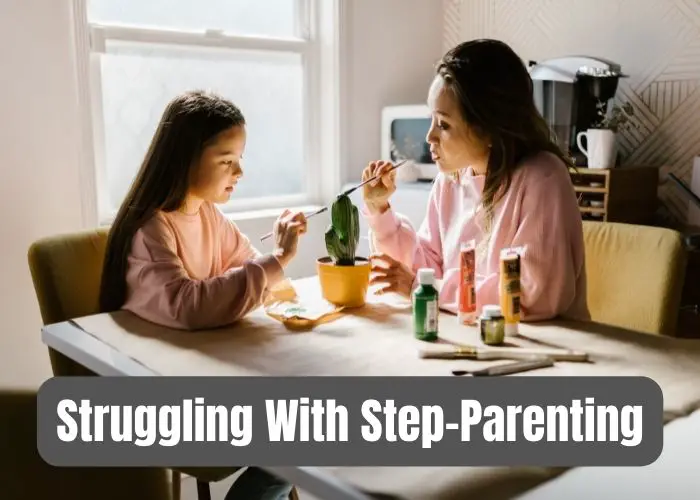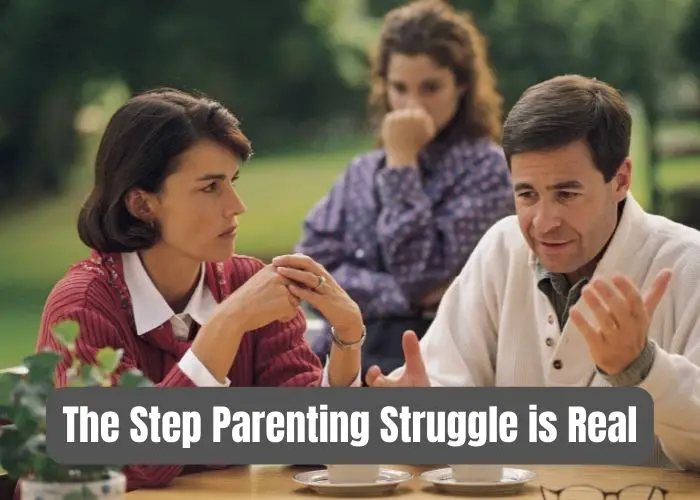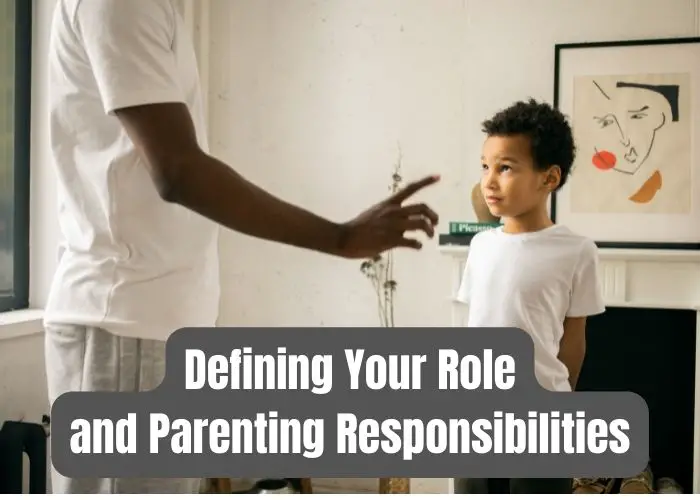I recently watched a talk show covering how to parent kids from your spouse’s previous relationship. It resulted in a heated argument with widely varying opinions.
To discipline, not to discipline, how to bond with your stepson or stepdaughter, especially if you don’t like them, the stress of transportation, honoring transition time, child support, alimony are just some of the problems we step-parents face.

It’s a lot, and if you are a step-parent, you basically deserve a medal if you are committed to raising children up to be good people.
Table of Contents
The Step Parenting Struggle Is Real – Real Demanding And A Real Thankless Job

I say unless you have lived it, you’ve got nearly no right to comment. This includes, ehem, therapists who claim to be experts on parenting but who have only dealt with, shall we say, “First Family Problems.”
When they are not your own children, you are going to need 100% support from your partner, the primary parent. If you don’t, things are going to be tough. You will set yourself up to feel angry because you certainly aren’t going to feel appreciated.
At least that has been my experience. There is a high divorce rate among second families, and if you don’t keep things in check, your own relationship will deteriorate.
In my situation, my husband was dealing with so much guilt around becoming a divorced family and the impact it would have on his kids that he didn’t want to follow through the same way he would have had he not gone through a divorce.
Anyone could have seen how important this was as a third party.
The problem was that he didn’t want his kids to see him as a bad person.
It was nearly impossible to sit by idle while he failed to lead our newly created blended family.
Defining Your Role And Parenting Responsibilities When They Aren’t Your Own Kids – Step-Parenting

When you become a step-parent, you might not know what your role should be.
According to Dr. Paul Jenkins, the first thing you need to wrap your head around is what your job ISN’T. Here are the hard truths as you step into your role for the stepchild as the new partner.
- It’s not your job to replace someone
- It’s especially not your job to be the disciplinarian
- It’s not your job to fix or repair or clean up all the messes
Your job is to love them even though they are not your own children.
Watch for feelings of frustration, anger, and resentment. These feelings show up because you are getting into areas where you don’t have any control.
Your own role in parenting responsibilities:
- You have to be able to set limits and boundaries
- Provider of good times and good things
Let the good times roll. I asked my stepson what good times I created.
He said, “You gave us Kitty time. It was great and it was reliable.” I used to scratch their backs or rub their feet before bedtime. My name is Kat, some call me Kitty. So, we called it Kitty time. Sometimes, this time would morph into a full-blown spa night with aromatherapy and salt lamp lights.
I found it interesting that he said it was reliable. Apparently, it was something that I never withheld from the kids even when stepparenting had worn me out.
I imagine if your love appears to be up and down and generally unreliable, you could end up being the source of yet one more unstable thing in a kid’s post-divorce world.
As a provider of good times, this doesn’t have to be Disney if you know what I mean. It’s what works for you. As a case in point, a seemingly small thing can leave a lasting, positive impact.
The most important thing to remember is that you are there to support the biological parent in raising the children. You are not there to replace the other parent but to supplement their parenting. You are primarily there to form new relationships with the kids as a new family.
Spend time with your step kids, and realize that it’s okay to stop what you are doing if you aren’t having fun.
That means that you should be involved in the children’s lives as much as possible. Attend their school events, help with homework, and be there for them when they need someone to talk to.
At the same time, you need to respect the biological parent’s role in the children’s lives. If they don’t want you to be involved in a certain aspect of their parenting, then respect their wishes.
The most important thing is to be supportive and loving towards the children. They need to know that they can count on you, no matter what. By being there for them, you can build a strong relationship that will last a lifetime.
Don’t discipline unless it’s with toddlers because they need it for their own safety. Otherwise, step aside.
Personally, I can’t do it. I guess that’s life. So much for good advice. I won’t go down without a fight to try to make a difference for my stepkids. You need to figure out where your personal views line up and do what is right for you.
In the same way, blended families and single parents must learn to cope and figure out a way to develop a great relationship with their kids; I don’t want to leave any closed doors behind me without knowing that I gave it all in my life even if that has left me looking like the bad guy at times. Life is more than just trying to avoid the stereotypical wicked step-parenting role.
The Thankless Job Of Parenting Children From A Previous Relationship And The Blended Family

I’ve spent a lot of time reading through step-parenting forums and comments. I’m confronted with the overwhelming truth that most say that step-parenting isn’t worth it. You are going to need to find other stepmoms that are committed to finding peace in the midst of the chaos and drama; otherwise, it’s too easy to lose hope.
It’s essential to realize that suppressing resentment and anger issues is likely to lead to your own divorce.
Know When And How To Disengage
Years ago, I remember I finally chose to STOP. My resentment level had climbed to an all-time record.
I decided I wasn’t going to cook. I wasn’t going to clean. I was going to completely disengage.
My step kids had gotten on my last nerve, and if they were going to continue to expect me to play mom, something had better change. I was hoping their father would begin putting the necessary rules in place.
The result was kind of surprising. When I gave myself permission to disengage and fight for my own sanity, I was in a better headspace. This, in turn, has a positive influence on everyone in the house.
I learned that if I were going to do something that made me resentful, I was better off not doing it at all.
I truly understand what turns people into wicked step-parents (I’m not saying abusive). If you don’t take a time out, you will burn out.
I instituted a new rule with the kids. If I’m not having fun, no one is. So when they ignore my requests, it’s not fun for me. In turn, I’m not going to see to it that they are having their fun.
It’s a difficult balance to learn but worth the effort.
Why Is Step-parenting So Hard?
Taking on a step-parenting role often feels like a no-win situation. It’s a low control, high demand position in a family. Combine that with a bunch of unsaid expectations on what your role should be and what your role shouldn’t be.
Trying to avoid conflict with the biological parent is also a challenge. Additionally, stepchildren may be resistant to the idea of a step-parent and may act out in order to make their life difficult. Blending families can be emotionally challenging, and as a step-parent, you may feel like you are constantly navigating new territory.
What Step-parents Should Not Do

As a step-parent, it’s important that you avoid doing anything that could make your stepchildren feel uncomfortable or resentful. Here are some things to avoid:
Don’t try to replace the child’s biological parent. It’s important to respect the role that the other parent plays in the child’s life and to let them know that you’re not trying to take their place.
Don’t force the child to call you “mom” or “dad.” Let them decide what they’re comfortable with and go at their own pace.
Don’t try to discipline the child the way you would your own. It’s important to respect the rules and methods that the biological parent has in place.
Don’t be overly critical of the child. They’re already dealing with a lot of adjustment and change, so try to be understanding and patient.
Do your best to create a loving and supportive home environment for your stepchildren. They need to know that they’re safe and loved, even if their home life isn’t perfect.
According to Jamie Scrimgeour, a stepmom who has her own life and step-parenting, You have to stop wasting time on certain aspects of your new blended family. I recommend you follow Jamie on her YouTube channel.
Things Stepmoms Waste Their Time On And Should Stop:
1. Don’t worry about what others think your role should be.
2. Trying to enforce rules and values that neither parent is on board with.
3. Don’t spend time comparing your relationship to that of the ex. or feeling insecure for not getting the same experience. Don’t spend your time thinking about what they did together. Focus on what you’re going to do together.
4. Don’t worry about how his ex-spouse parents her kids. They are her kids, and she gets to parent them however she wants in her home. Her home her rules, just like your house, your rules.
5. Your family will not work the same as other first families. There is always another player in the game.
